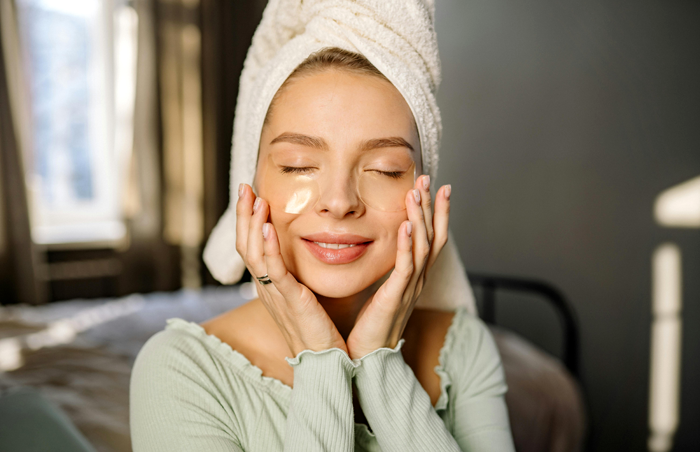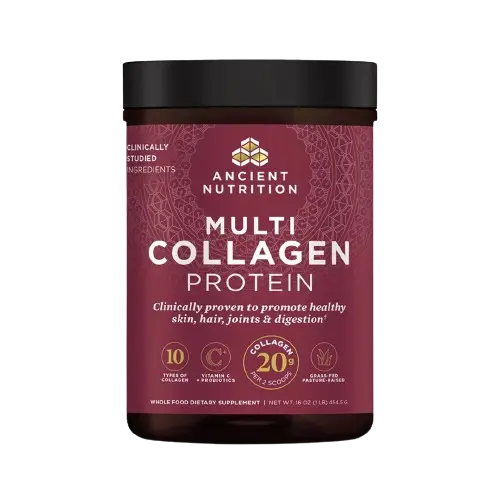This post contains affiliate links. Read my full diclosure HERE.

Menopause is a season of change – both for your body and your skin. One day, your skincare routine is working just fine, and the next, your skin feels drier, thinner, and a little less elastic. These changes are influenced by hormonal shifts – the decline in estrogen levels affects collagen production, hydration retention, and skin resilience. But don’t worry – this isn’t about “fighting” aging. Instead, let’s talk about how to care for your skin with kindness, keeping it healthy, strong, and radiant through these hormonal shifts.
How Menopause Changes Your Skin
Why does menopause affect your skin so much?
Estrogen plays a key role in keeping your skin plump, hydrated, and firm. When its levels decline, a few things start happening:
Collagen loss – You might notice more fine lines, sagging, or a less bouncy feel. Estrogen helps maintain collagen, and without it, skin loses structure.
Increased dryness – Your skin doesn’t hold onto moisture as well, making it feel tight, flaky, or more sensitive than before.
Thinner, more delicate skin – Skin can become more prone to irritation or slower to heal.
Hormonal breakouts – Some women experience acne again, often due to a shift in oil production.
But, your skincare routine can be adjusted to support these changes.
♦ READ NEXT: Top 10 Benefits of Collagen Powder for Youthful Skin
Essential Skincare Adjustments for Menopausal Skin
Now that we know what’s happening under the surface, let’s see what you can do. The key is to be gentle yet effective – think nourishing instead of stripping, hydrating instead of drying.
1. Hydration Is Everything
With moisture levels dropping, your skin craves hydration. Look for humectants like hyaluronic acid, glycerin, and ceramides. These ingredients act like a tall glass of water for your skin, keeping it plump and comfortable. A rich, barrier-repairing moisturizer can also work wonders, especially at night.
Pro tip: Hydration starts from the inside too! If you’re not drinking enough water or getting electrolytes, your skin will feel it.
♦ READ NEXT: How to Hydrate Your Body Properly
2. Collagen Support: The Building Blocks of Firm Skin
Since collagen production naturally declines, it’s a good idea to encourage it both internally and externally. Peptides, vitamin C (like THIS ONE) are fantastic for helping skin stay firmer.
And don’t forget nutrition – eating enough protein is crucial since collagen is literally built from amino acids. If you’re not getting at least 30g of protein per meal, your skin might not have what it needs to regenerate effectively.
Check out my article on The Benefits of High-Protein Meals for Women
3. Gentle Exfoliation to Keep Skin Glowing
You might notice your skin looking duller. This is because cell turnover slows down with age. Gentle exfoliation with lactic acid or low-dose glycolic acid (once or twice a week) can help brighten your complexion. The key here is moderation – too much exfoliation can weaken an already delicate skin barrier.
4. Protecting and Strengthening the Skin Barrier
With thinning skin, your barrier function becomes more important than ever. This means:
Avoiding harsh foaming cleansers (opt for something creamy and nourishing instead).
Using a thicker moisturizer at night to lock in hydration.
Adding barrier-repairing ingredients like ceramides, squalane, and niacinamide.
If your skin has suddenly become sensitive, it’s a sign that your barrier needs extra care. Keeping it strong will help reduce irritation, redness, and dryness.
Beyond Skincare: Lifestyle Factors That Support Your Skin
Your skincare routine is just one part of the puzzle. Your lifestyle – what you eat, how you sleep, and how you manage stress – plays a huge role in how your skin looks and feels.
Sleep: The Ultimate Skin Repair Time
Ever notice how your skin looks tired when you don’t sleep well? That’s because nighttime is when skin does most of its healing and regenerating. Prioritizing good sleep habits can help keep skin looking fresh and healthy.
Nutrition for Radiant Skin
Your skin reflects what you eat. A diet rich in healthy fats (avocados, nuts, olive oil), protein (eggs, fish, chicken, tofu), and antioxidants can help combat oxidative stress and inflammation. Try my easy recipe for Antioxidant Powerhouse Salad
I personally love adding these collagen peptides to my drinks, especially in the colder months. It’s an easy way to give your skin a little extra love from the inside.
Stress & Hormones: Keeping Cortisol in Check
Chronic stress can accelerate aging. Why? Because high cortisol levels break down collagen and increase inflammation, making your skin look dull and tired. Finding ways to relax – whether it’s through deep breathing, yoga, or a simple evening ritual – can benefit your skin just as much as your mind.
Women’s Tincture blends ancient herbs to support holistic wellbeing and aids in stress relief and hormonal balance.
A Menopause-Friendly Skincare Routine
Here’s a simple structure of a good skincare routine during menopause to follow:
Morning:
Gentle hydrating cleanser
Antioxidant serum (like vitamin C)
Lightweight moisturizer with ceramides
Broad-spectrum SPF
Evening:
Creamy cleanser (to avoid stripping your skin)
Peptides
Rich, nourishing moisturizer
Final Thoughts
Menopause brings changes, but that doesn’t mean you can’t have glowing, healthy skin. With the right skincare, hydration, nutrition, and lifestyle adjustments, your skin can stay resilient and radiant.
The key is to be gentle. Adapt as needed. And most importantly, listen to what your skin is telling you.
Want to dive deeper into any of these topics? Here are some of my related articles to explore:
Note: Always consult with your medical professional before making any health-related decisions or implementing significant changes to your diet.
Let's connect
Sign Up for news and special offers
+ get our FREE guide!
Thank you!
You have successfully joined our subscriber list.
Check your email!






